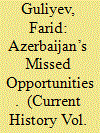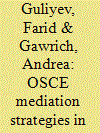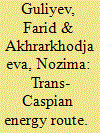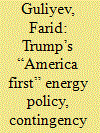| Srl | Item |
| 1 |
ID:
169616


|
|
|
|
|
| Summary/Abstract |
“The consequences of this missed opportunity are serious and will be felt in the not-so-distant future when the oil deposits have drained away.
|
|
|
|
|
|
|
|
|
|
|
|
|
|
|
|
| 2 |
ID:
181639


|
|
|
|
|
| Summary/Abstract |
Even though the Organization for Security and Cooperation in Europe (OSCE) has performed mediation efforts in Eurasian secessionist conflicts, its role has been neglected by mainstream international relations (IR) and conflict mediation literature. To fill in this gap, this article examines OSCE mediation strategies in two major secessionist conflicts: the Nagorno-Karabakh (NK) conflict between Armenia and Azerbaijan and the conflict in Eastern Ukraine. Drawing on Zartman’s conceptual framework, this study posits that OSCE mediation strategies were constrained given its weak organisational capacity, lack of legal empowerment and adverse geopolitical environment. Due to these structural limitations, the OSCE can be said to have been more effective in containing conflict than contributing to conflict resolution. This article aims to contribute to conflict mediation research by highlighting the importance of context for understanding the role of international organisations (IOs) as mediators.
|
|
|
|
|
|
|
|
|
|
|
|
|
|
|
|
| 3 |
ID:
088991


|
|
|
|
|
| Publication |
2009.
|
| Summary/Abstract |
The article delineates the major national, regional and international level stakeholders in the westward Trans-Caspian transportation of Kazakh oil, supplemented with a discussion of the prospect of expansion of the Trans-Caspian/South Caucasus corridor in light of the presumably harmful effect of the war between Russia and Georgia in August 2008. It demonstrates that while foreign companies have been backed by their respective governments, national firms have also enjoyed considerable state support, partly due to their close links to the interests of state elites in Kazakhstan and Azerbaijan. It appears that most companies along the shipping line either belong to the governments of Kazakhstan or Azerbaijan, directly or indirectly (through subsidiaries), or enjoy favoritism and a near monopoly in their markets (crony capitalism). Some of these firms are privately owned but registered in offshore tax havens, while some others have rather obscure ownership structures and corporate profiles. It suggests that cronyism and state capture comprise that politico-economic environment within which the future of Caspian transport systems will have to be decided.
|
|
|
|
|
|
|
|
|
|
|
|
|
|
|
|
| 4 |
ID:
176756


|
|
|
|
|
| Summary/Abstract |
The global energy system is in transition to a new energy order characterized by the emergence of the United States as a net oil exporter, the shale revolution and the gradual shift towards low-carbon sources and renewables. The shale boom in the US was a game changer, as was the election of Donald Trump as US president. Trump pushed an ambitious “America first” agenda aimed at transforming the US into a global energy superpower. The purpose of this article is two-fold: first, it outlines the key pillars of the emerging global energy order. Second, it underscores the role of contingent events, a factor neglected by some previous studies because of their reliance on what A.O.Hirschman (1970) termed “paradigmatic thinking”. The recent transition in the international energy order is an outcome of two paramount, yet largely unanticipated events: the shale revolution in the US and Trump’s neomercantilist and unilateralist economic policies. While contingencies are an inherent feature of social reality, the scenario approach can be a useful heuristic for dealing with uncertainties. The article concludes by discussing the implications of these developments for global energy governance.
|
|
|
|
|
|
|
|
|
|
|
|
|
|
|
|